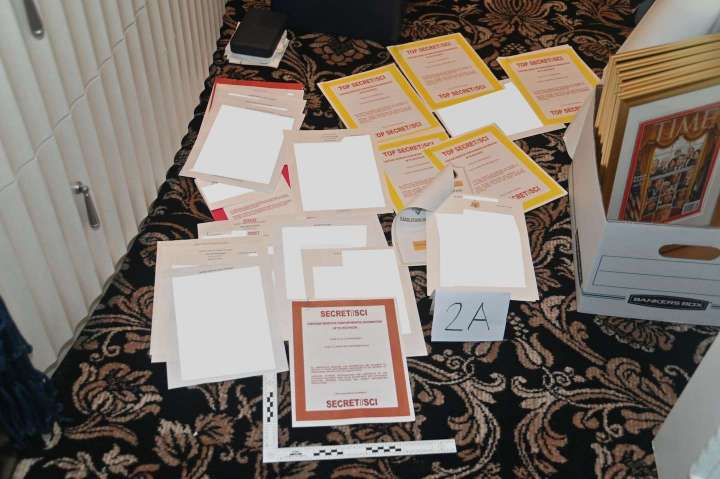For weeks, Donald Trump has benefited from the orders of a judge who has proven conspicuously incurious about his public claims that he declassified the documents labeled confidential, secret or top-secret seized from his residence at Mar-a-Lago last month.
The holes in Trump’s latest delay tactic

In a new filing to the special master now charged with reviewing the documents, Raymond J. Dearie, Trump’s legal team attempts to beg off Dearie’s request for it to finally, at long lost, address in court what Trump has claimed publicly about declassifying the documents.
The filing makes two main arguments on that front. One is that taking a position on the classification status of approximately 100 documents marked classified that were seized on Aug. 8 could jeopardize Trump’s potential criminal defense. The other is that Judge Aileen M. Cannon didn’t require Dearie to determine whether the documents are classified.
The latter, in particular, is a stretch.
Cannon’s original order didn’t dwell on whether the documents might have been declassified, but she did charge the special master “to review the seized property, manage assertions of privilege and make recommendations thereon, and evaluate claims for return of property.”
The Justice Department then asked that it be allowed to continue reviewing only the documents marked classified and that such documents be excluded from the special master’s review, which drew the Trump legal team into actually addressing the matter. In its filing, though, Trump’s lawyers skirted the issue, calling the documents’ classification status into question but not actually disputing that they remained classified — and accordingly, not echoing Trump’s public claims. That was good enough for Cannon, who denied the DOJ’s request while accepting the Trump team’s argument that this fact is in dispute.
But in rejecting the request and naming Dearie as special master, Cannon again charged him with parsing the status of documents. She listed among his duties: “Identifying personal items/documents and Presidential Records in the Seized Materials and making recommendations to the Court as to any categorization disputes between the parties.”
Again, Cannon didn’t dwell much upon the classification issue. And that listed duty specifically addresses “personal items” and “Presidential Records” rather than whether documents are classified.
But it also says he must make “recommendations to the Court as to any categorization disputes between the parties” (emphasis added). Cannon elsewhere explicitly described the classification status as a disputed fact, meaning Dearie would sure seem to be charged with resolving it. And that would seem to involve establishing the two sides’ views on their status.
Cannon also charged Dearie with reviewing the documents marked classified first, meaning Dearie could determine there is particular urgency in resolving their actual status. Dearie is set to meet with the Justice Department and Trump’s lawyers Tuesday afternoon.
The Trump team’s other argument — that it can’t disclose its position because it could jeopardize Trump’s criminal defense — would also seem to be undercut by the fact that Trump keeps claiming publicly that he declassified all the documents. That includes as recently as Friday. How that might play in a criminal case remains to be seen, but it’s not like he’s played this claim close to the vest.
And all of this should be viewed in the appropriate context, which is that Trump’s legal team is trying to prolong this matter. That could be because his lawyers fear Trump’s declassification claim is false — opening themselves up to legal repercussions — or because they don’t think they can prove it. It could also be because they want Cannon, a Trump-nominated judge who has sided with them in controversial ways, to weigh in as much as possible as Dearie’s review progresses.
Another reason, of course, is that they see value in prolonging these matters as much as possible. Getting a special master in the first place was a way to draw things out and delay the Justice Department’s criminal investigation.
That’s because one of the lessons of Trump’s political career is that the lengthier the proceedings, the better it augurs for Trump. The Russia investigation played out over years, and by the time a bipartisan Senate report bolstered claims that Trump’s campaign might have coordinated with Russia in a way the Mueller report hadn’t, those findings were received as old news. People had tuned out. In the case of the documents at Mar-a-Lago, more Americans believe Trump broke the law than have in just about all of his previous controversies, including the Russia probe.
Dearie — whom the Trump legal team recommended for the special master position, and the Justice Department deemed acceptable — has a reputation as being particularly slow and deliberate. But he’s now proposed a rather aggressive timetable, aiming for the completion of the inspection and labeling process by Oct. 7, according to the Trump filing. Trump’s team is also pushing for a more delayed timetable in general, which includes waiting to assert whether the documents were declassified until a hearing in late November — at the tail end of the timetable Cannon set for Dearie’s review, which concludes Nov. 30.
That doesn’t appear to be any coincidence. If Monday night’s filing is any indication, the Trump legal team will try to gum up the works, even with the special master they themselves recommended. We’ll begin to learn more Tuesday afternoon about just how much Dearie is willing to entertain that.






